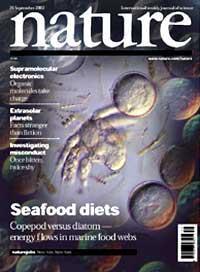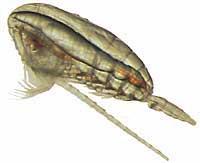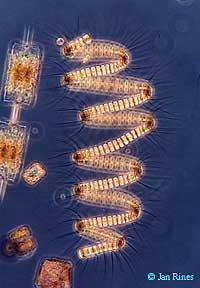Algae are not toxic to copepods

Xabier Irigoien, of the AZTI Foundation, in collaboration with oceanography and research institutes from five other countries, has conducted
a study on copepods, analyzing the influence of food on copepod reproduction.
Copepods are microscopic animals living in the sea. Their level in the marine food chain is important as they are one of the staples of fish. Therefore, the abundance of copepods is essential for there to be a lot of fish.
At the same time, copepods feed on phytoplankton. Phytoplankton consists of several microscopic algae, among which diatoms stand out. Therefore, diatoms, copepods and fish constitute an important food chain in the marine ecosystem.
Several studies with copepods and diatoms have been conducted in the laboratory and some of them suggested that diatoms could influence the proliferation of copepods. It seems that diatoms produced a potentially toxic compound for copepod eggs.

Irigoien, and the team of scientists he has coordinated, have studied whether this occurs in nature, that is, whether a significant increase in the population of diatoms at sea affects the reproductive capacity of copepods or not. Samples have been taken from marine ecosystems rich in diatoms such as Oregon, Namibia and the Norwegian fjords.
These samples of diatoms have been compared to the rate of proliferation of copepods in each location and have concluded that none of them affect. According to them, the reduction in the proliferation rate of copepods in laboratories may be due, on the one hand, to the shortage of nutrients that may contain diatoms and, therefore, to the decrease in the proliferation rate of copepods if only consumed. On the other hand, the type of diatom used to feed copepods may also be toxic.
However, this latest scientific research has shown that this does not occur in nature, so diatoms do not cause any harm in the food chain.

Xabier Irigoien is a 35-year-old Hondarribiarra. He studied biology at the University of the Basque Country in Leioa, completed his studies in oceanography at the University of Bordeaux, where he studied both the master's and the doctoral thesis. He worked for two years at the Barcelona Institute of Sea Sciences and the last 6 years in Britain. At the Plymouth Marine Laboratory and Southampton Oceanography Centre,
Nature has done the research it has just published. Currently, Xabier Irigoien works in Pasaia, AZTI Foundation, after obtaining the Ramón y Cajal scholarship for 5 years.
All the details of the investigation will be reported by Xabier himself next Wednesday in the Norteko Ferrokarrilla program of Euskadi Irratia, from 8 pm.
Buletina
Bidali zure helbide elektronikoa eta jaso asteroko buletina zure sarrera-ontzian











